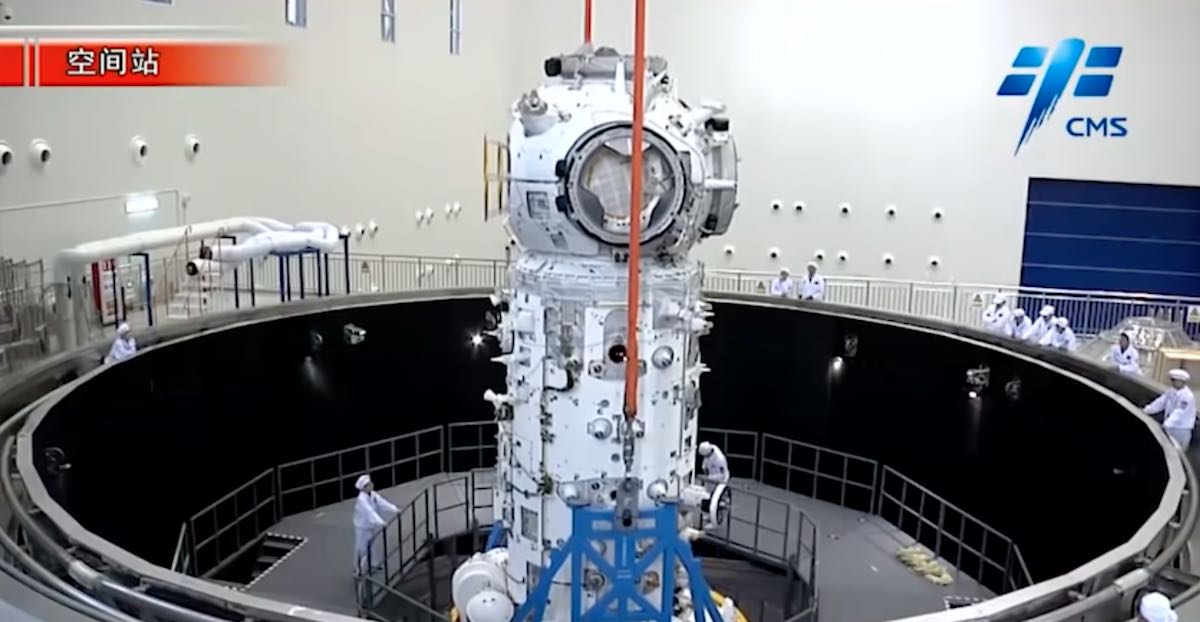In Today’s Deep Space Extra… China launched the first element of its space station. Apollo 11’s Mike Collins passed away Wednesday. Former U.S. Sen. Bill Nelson’s nomination to become NASA administrator cleared the Senate Commerce Committee, advancing to the full Senate.
Human Space Exploration
China launches Tianhe module, start of ambitious two-year station construction effort
NASAspaceflight.com (4/28): Late Wednesday, China launched the Tianhe core module of its planned space station from the Wenchang Spacecraft Launch Site, a step toward establishing a permanent human presence in orbit for that country. A docking hub at the forward end of Tianhe will accommodate additions of two science modules at radial ports. Tianhe will also provide docking access for the Tianzhou and Shenzhou cargo and crew spacecraft at forward and nadir docking ports.
China is preparing to launch three astronauts to its new space station
Space.com (4/28): On the heels of the launch late Wednesday of its first module for China’s space station, that country is preparing for the launch of three taikonauts, its term for astronauts, to meet up with the station’s initial elements in the June timeframe. A cargo mission launch is planned for May.
Apollo 11 astronaut Mike Collins passes away
Spacepolicyonline.com (4/28): Collins, who served as the command module pilot aboard the 1969 Apollo 11 mission, the first mission to land humans on the Moon, passed away on Wednesday. Born in Rome, Collins graduated from the U.S. Military Academy at West Point before serving in the Air Force and joining NASA’s third class of astronaut candidates. He joined the late John Young aboard Gemini 10 in 1966 before his assignment to Apollo 11 with Neil Armstrong and Buzz Aldrin. Collins circled the Moon solo in the Columbus command module while Armstrong and Aldrin descended to the lunar surface. A cancer victim, Collins was 90.
Opinion
Competition delivers the goods and the crew for all NASA commercial space services
Coalition Member in the News – Boeing
SpaceNews.com (4/29): Noting the recent successes of NASA’s commercial crew and cargo programs in their support of the International Space Station (ISS) in the post-shuttle era, Greg Autry in an op-ed urges policy makers and Congress to come together in supporting and adequately financing the development of multiple lunar Human Landing Systems (HLS) to support the return of humans to the surface of the Moon. Earlier this month, NASA only selected one company to pursue the next phase of an HLS, though the agency had said it would select more than one provider. Autry, an Arizona State University (ASU) professor of space leadership, policy and business, was a member of the Trump Administrations transition team. He serves on the FAA’s Commercial Space Transportation Advisory Committee.
Other News
Senate Commerce Committee advances Nelson nomination to lead NASA
SpaceNews.com (4/28): Former U.S. Sen. Bill Nelson on Wednesday received the backing of the U.S. Senate Commerce Committee, advancing his nomination to become NASA’s administrator on to the full Senate. The panel met in executive session and affirmed Biden’s choice to lead the agency by bipartisan voice vote.
Beyer seeks funding for NASA in infrastructure bill
SpaceNews.com (4/29): Speaking at a Washington Space Business Roundtable webinar yesterday, Rep. Don Beyer (D-VA), chairman of the House space subcommittee said he is working to secure funding for NASA as part of the infrastructure package proposed by the President. “Making sure NASA has the infrastructure it needs” is a priority, said Beyer, adding that much of the agency’s infrastructure is 40 years old with a maintenance backlog estimated at $2.6 billion. During the event, the congressman also mentioned other priorities for him, such as passing a NASA authorization act, help to solve the issues of orbital debris and space traffic management, and receiving word from NASA on its ability to maintain a 2024 goal for returning humans to the lunar surface under the Artemis program.
Vega return to flight creates competition for 30-centimeter satellite imagery
Coalition Member in the News – Maxar
SpaceNews.com (4/29): An Arianespace Vega rocket successfully launched a new generation satellite imager for Airbus Space and Defense and a handful of smaller payloads from French Guiana late Wednesday. It marked the first flight for the Vega since a November 16 launch failure with a pair of European Earth observation satellites.

